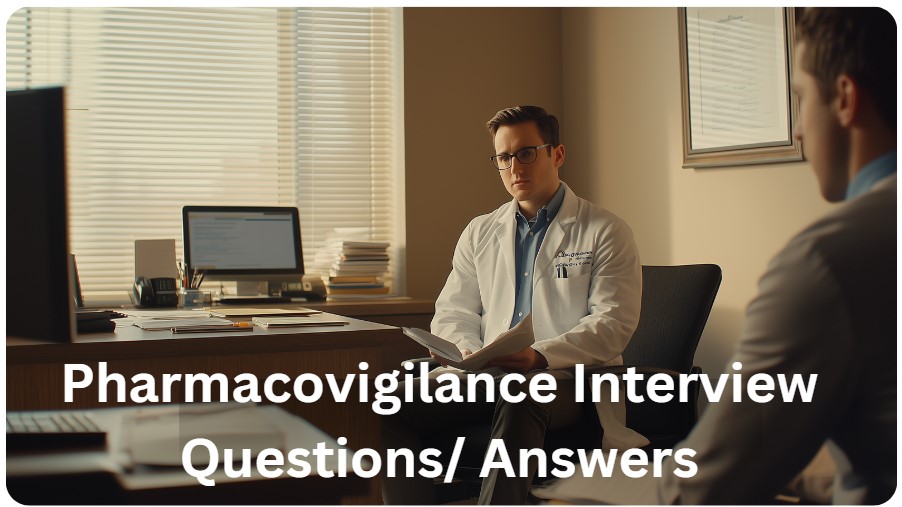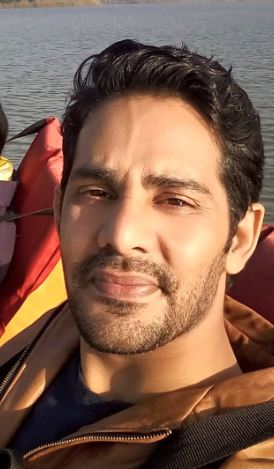The WHO defines pharmacovigilance as “the science and actions connected to the detection, assessment, understanding, and prevention of adverse effects or any drug-related problems.” These Pharmacovigilance Interview Questions/ Answers are prepared by experts from Cognizant, Accenture, Novartis, IQVIA, Sanofi-Aventis, Merck, Covance, Pfizer, TCS, Bioclinica, and Syneous Health.

Pharmacovigilance Interview Questions for Fresher
Wipro Pharmacovigilance interview questions and answers for freshers are provided below:
Question 1. Do you hear about antibiotics?
Ans: We can define it as antibiotics are substances produced by various species of microorganisms like bacteria, fungi, etc. that suppress the growth of microorganisms and eventually may kill them.
Question 2. Did you hear the name azithromycin?
Ans: It is a very common antibiotic used in the treatment of bacterial infections like bacterial infections of the tonsils, ear, and nose skin infections stuffed tissues, and lung infections.
Question 3. Is it a narrow spectrum or a broad spectrum?
Ans: It comes under a broad spectrum.
Question 4. what do you mean by broad spectrum?
Ans: For antibiotics, broad-spectrum antibiotics are a kind of antibiotics that are effective against a wide range of organisms, or that kind of antibiotics that act on the two major bacterial groups, gram-positive and gram-negative.
Question 5. how do we differentiate gram-negative and gram-positive bacteria?
Ans: If we do a gram-negative staining process the result of this process is gram-negative takes the violet colors and gram-positive bacteria pink.
Question 6. give some examples of antihypertensive drugs
Ans: Different hypertensive drug classes are:
ACE inhibitors: ramipril, captopril, and quinapril
ACE antagonist: Telmisartan, valsartan and losartan
Ca Channel blocker: verapamil, amlodipine
Diuretics: Furesamide, methacrylic acid and hydrochlorothiazide
Beta adrenargic blocker: atenolol and propranolol
Alfa adrenargic: Terazosine and Praxosine
Centrally acting: Methyl dopa and clonidine
Adrenergic Nero blocking agent: Reserpine
Question 7. Tell me how ACE inhibitors work.
Ans: ACE means angiotensin-converting enzyme, which is responsible for converting angiotensin I to angiotensin II, Where angiotensin II is responsible for NaCl reabsorption. ACE inhibitors inhibit the process of converting angiotensin I to angiotensin II which causes decreased NaCl reabsorption and decreased blood pressure.
Question 8. Where the beta cell is present?
Ans: Beta cells are present in the human Heart.
Question 9. Tell me the name of the hormone which is blocked by beta-blocker. Do you know the name of this hormone?
Ans: It is an epinephrine hormone, Beta blocker works by blocking the effect of this hormone.
Question 10. Some diuretic are used in hyoertension why we use diuretic in hyoertenssion?
Ans: Diuretics work on our kidneys by increasing the amount of salt and water that come out through the urine. too much salt can cause extra flow to build up in human blood vessels which causes rising blood pressure by flushing salt out from the human body. Diuretic also causes the walls of the human vessels to relax and widen which makes it easier for blood to flow through this effect also lowers blood pressure.
Question 11. What was your Project topic/ Project Thesis?
Ans: Pharmacology and drug development in rare diseases: the attractiveness and expertise of the French medical pharmacology.
Note: The most prevalent mistake that M.Pharm students make is failing to revise their thesis work. Take my word for it: a good interviewer will undoubtedly inquire about your thesis work. Please be comprehensive, and do not provide any replies that allow the interviewer to ask another question. Just be brief, and if you are unsure of the answer, simply state that you do not know.
Question 12. What are Glycolysis and Gluconeogenesis?
Ans: Glycolysis: Glycolysis is a process one molecule of glucose is converted into two molecules of pyruvate, two hydrogen ions, and two molecules of water[1].
Gluconeogenesis: It is a metabolic pathway that results in the generation of glucose from certain non-carbohydrate carbon substances[2].
Question 13. commonly asked Drug Schedule?
Ans: Schedule H: This includes being sold under prescription only. E.g. Alprazolam.
Schedule X: Psychotropic drug comes under S-X, the label should contain the warning. E.g. Barbiturates.
Schedule Y: Describe the requirements and guidelines for conducting the clinical trials.
Read Also: Medical Coding Interview Questions with Answer
Question 14. What are the different types of diabetes?
Ans: Type I Diabetes: type I diabetes are autoimmune condition, it is also called insulin-dependent diabetes. it happens when the body attacks the pancreas with antibodies [3]. At this time organs become damaged and do not make insulin.
Type II Diabetes: This is non-insulin-dependent diabetes. when the pancreas usually creates some insulin, but it is not sufficient or the body does not use it.
Pharmacovigilance interview questions related to Drug side effects:
Question 15. tell me the side effects of losartan.
Ans: Losartan causes pain, burning during urination, shortness of breath, rapid heart rate, pain in the chest, vomiting, and nausea.
Question 16. Tell me the side effects of Amlodipine.
Ans: Amlodipine causes Dizziness and swelling of the feet.
Question 17. Why do we need Pharmacovigilance?
Ans:
- Quantify and recognize risk factors for ADR.
- Unexpected adverse reactions.
- Drug-Drug interactions.
- Long term efficacy.
Question 18. Abbreviations : (Abbreviations that are mostly asked during PV interviews):
Ans: ADE- Adverse Drug Event
ADR- Adverse Drug Reaction
SAE- Serious Adverse Event
CIOMS- Council for International Organizations of Medical Sciences [4]
SUSAR- Suspected Unexpected Serious Adverse Reaction
SSAR- Suspected Serious Adverse Reaction
PSUR- Periodic Safety Update Report
ICH- The International Conference on Harmonization
Pharmacovigilance Interview Questions for Exprienced Candidates
Question 19. What is an Adverse Drug Reaction (ADR)?
Ans: An adverse drug reaction (ADR) is an unintended and noxious effect that is attributable to a medicine when it has been given within the normal range of doses [5].
Question 20. What is an Adverse Event (AE)?
Ans: An adverse event (AE) is an undesirable occurrence that occurs in the context of drug treatment but may or may not be causally related to medicine.
Question 21. What is the basic minimum required for a valid case?
Ans:
- An identifiable reporter
- An identifiable patient
- A suspect product
- An adverse drug event
Question 22. When do you think an event is serious?
Ans:
- Death
- Life-threatening
- hospitalization and prolongation of hospitalization
- Congenital anomaly
- Disability
- Medically significant
Question 23. What do you mean by MedDRA?
Ans: Medical Dictionary for Regulatory Activities.
Question 24. Tell me the hierarchy in MedDRA.
Ans: System Organ Class (SOC)
High-Level Group Term (HLGT)
High-Level Term (HLT)
Preferred Term (PT)
Lower Level Term (LLT)
Question 25. What are the types of Clinical Trials?
Ans: Randomized
Non-Randomized
Single-Center
Multi-Center
Phase I, II, III, and IV Trials
Question 26. Can you tell me about the job opportunities after completing this course?
Ans: Persons trained in Pharmacovigilance and clinical trials research will find good job options in the following sectors:
Pharmaceutical and biotech companies
Clinical Research Organizations
Regulatory Agencies like DCG (I) & CDSCO
Pharmacovigilance units in Medical colleges and hospitals
Basic Pharmacovigilance Interview Questions
Question 27. What are the Basic Principles of Pharmacovigilance?
Ans: Continuous monitoring of the safety of medicines (both old and new) throughout the duration of their use Identification & quantification of ADRs
Question 28. What is a Suspected unexpected serious adverse drug reaction (SUSAR)?
Ans: A serious adverse reaction, in which the nature or severity is not consistent with domestic labeling or market authorization, or expected from characteristics of the drug.
Question 29. What do you mean by Serious Adverse Event or Reaction (SAE)?
Ans: A serious adverse event or reaction is any untoward medical occurrence that at any dose results in death, requires inpatient hospitalization or prolongation of existing hospitalization, results in persistent or significant disability, or is life-threatening.
Question 30. What is a signal?
Ans: An alert from any available data source that a drug may be associated with a previously unrecognized hazard is quantitatively or qualitatively different from existing expectations.
Question 31. When were GVP guidelines put in place?
Ans: They became effective in July 2012.
Question 32. What is the frequency of the DSUR?
Ans: The first DSUR duration should not exceed one year. The DSUR is always filed once a year.
Question 33. What exactly is VigiBase?
Ans: The WHO Global ICSR Database’s name.
Question 34. Roles in Pharmacovigilance
Ans: Drug Safety Associate / Drug Safety Scientist
Pharmacovigilance expert o Drug Safety Physician
Medical reviewer
Pharmacovigilance Executive
Pharmacovigilance associate
Pharmacovigilance – Data Analyst
Pharmacovigilance Scientist
Medical Safety Expert
Question 35. HR round interview question in Pharmacovigilance?
Ans:
- Tell me about your family
- Where from you, place name
- Working hours
- Shifting
- Off day
- Facilities
- Salary discussion
- Documents
People also Searching:
- TCS pharmacovigilance interview questions
- Iqvia pharmacovigilance interview questions
- Pharmacovigilance interview questions and answers pdf free download
- Pharmacovigilance interview questions and answers
- Interview questions for Pharmacovigilance Fresher
- 2024 pharmacovigilance interview questions
- Syneos pharmacovigilance interview questions
References:
- https://www.khanacademy.org/science/biology/cellular-respiration-and-fermentation/glycolysis/a/glycolysis
- https://en.wikipedia.org/wiki/Gluconeogenesis
- https://bhamnow.com/2020/11/03/a-fun-resourceful-guide-to-diabetes-awareness-month-this-november-in-birmingham/
- https://www.linkedin.com/posts/yogesh-patel-92530357_basic-pharmacovigilance-interview-questions-activity-7097819190421590017-T1tE

Naresh Bhakar is the Founder and Author at Pharmaguddu.com, bringing his extensive expertise in the field of pharmaceuticals to readers worldwide. He has experience in Pharma manufacturing and has worked with top Pharmaceuticals. He has rich knowledge and provides valuable insights and data through his articles and content on Pharmaguddu.com. For further inquiries or collaborations, please don’t hesitate to reach out via email at [email protected].
